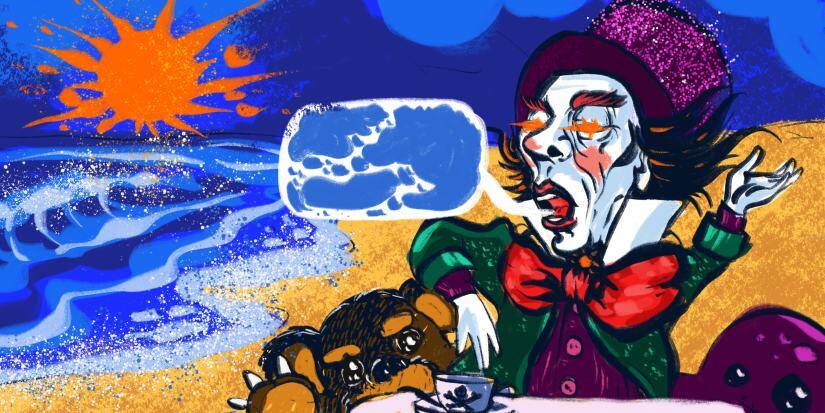Editor’s note: What does it mean to be ‘mentally ill’? In this weekly column, Sneha Rajaram writes about navigating through a ‘mentally ill’ life — encompassing aspects that are both everyday (medications, rights) and contemplative (the universality of suffering) Four years ago, I was invited by some sharp-sighted lecturers to speak at a college literary festival as part of a panel on ‘Madness as Metaphor’. I don’t recall what I said (I think a lot of it was quite literal), but I don’t think I fully understood the topic. I still don’t. I thought it meant “metaphors used to describe madness”, for instance, “one sandwich short of a picnic”. But what if it meant “madness used as a metaphor for something else”, as it often is in literature? Agonising over this is sure to lead to further madness, so I find myself asking instead what purpose metaphor serves in the realm of mental illness. Is metaphor a necessity or a luxury? Is metaphorising – some might even say romanticising – mental illness a privilege of those who have access to private psychiatry, medication, therapists and readings? Or does it belong just as much to those who travel from all over Karnataka and beyond, wait hours in the NIMHANS out-patient department and then stand for 90 minutes in the three-pronged pharmacy queue? Are metaphors a symptom of socio-economic privilege, or are symptoms a metaphor, as psychoanalysis – or, say, divine possession – would have you believe?
Though I lack the capacity or willingness to play gatekeeper, I do believe that metaphor can heal if used right. It has the power of transportation and can relieve the localisation of pain in our minds and bodies.
Author Sreevatsa Nevatia, in his memoir about living with bipolar type 1, writes about coming to terms with his childhood sexual abuse. He thinks of the god Shiva, who in Hindu mythology swallows poison to save the world from it: That poison is said to still swim in the god’s neck, making it blue, giving him the name Nilakantha, the One with the Blue Neck. Clenching my throat, hoping my neck too would turn a dark indigo, my suffering has been hard to swallow and my anger impossible to spit out. The pain of abuse can intensify if looked at as a microcosm of the world’s ills, but once made a common metaphor, it is diminished. [caption id=“attachment_5977421” align=“alignnone” width=“825”]  Illustration by Satwick Gade[/caption] Susan Sontag, on the other hand, writes in her book Illness as Metaphor: “My point is that illness is not a metaphor, and that the most truthful way of regarding illness — and the healthiest way of being ill — is one most purified of, most resistant to, metaphoric thinking.” This seems at first to be a sensible, Buddhist attitude to mental illness; yet the Pali canon is filled with allegories and metaphors used by the Buddha in his discourses, sometimes referred to in translation as “similes”. How can one combat a world full of (perhaps harmful) metaphors about mental illness without creating or finding metaphors to make one’s own? The insulin–serotonin analogy for depression is itself a metaphor that each of us must interpret it as we wish. Ironically, one of the best-known “mad” characters in canonical British literature – the Mad Hatter in Alice in Wonderland – begins his conversation with Alice with the nonsensical metaphor expected of the deranged (“Why is a raven like a writing-desk?”) but, when Alice responds in idiomatic language, he tells her, “…you should say what you mean”, almost as if he’d set a trap for her. Lewis Carroll seems, in three lines of dialogue, to have mastered the art of fighting metaphor with metaphor. This method of extinguishing metaphor is illustrated especially by the stories of Kisagotami and Patachara, two senior Buddhist nuns who lived in the time of the Buddha. Patachara, for instance, lost her husband, her children and her parents in a rainstorm. A recent edition of the Therigatha: Verses of the Elder Nuns, containing verses written by Patachara among others, says she “became mad with grief”. Eventually, after the Buddha had accepted her as a disciple and taught her the Dhamma, she attained enlightenment. The moment is described in the book as follows: One day, while she was meditating, she saw water “running” over dry sand, some [rivulets] being absorbed quickly, some a little longer, and some after that. She saw that what happened with humans, each of whom have different lengths of life, is not different than what happened with the water. The analogy seems to have helped Patachara to stop asking that question that causes so many of us so much suffering – “Why?” – to which the answer is often frustrating, leading to more “why”s. The question of metaphor and romanticisation all boils down, in my head, to an over-dependence on language and its cousin, conceptualisation. Language is beautiful, playful, tricky, fun; it makes us creative, disingenuous, transported, empowered. It relieves us of the loneliness of having a body. But the best way to handle language seems to be with a pinch of salt, since language cannot be a stand-in for life itself. Having a literal attitude to language and metaphor has always been an issue for me; on one level I could even say it precipitated me into mental illness as a teenager. When one regards a thing as it is without drawing conclusions, or breaks it down into its component parts ad infinitum, it becomes harder to put into words. A life without language – and with it, some relief from suffering – only became a possibility for me after encountering Buddhism, which miraculously – don’t ask me how – manages to use metaphor to neutralise metaphor. The best part is, learning that language is not a necessity makes it all the more beautiful. _Read more from this series here _


)
)
)
)
)
)
)
)
)



